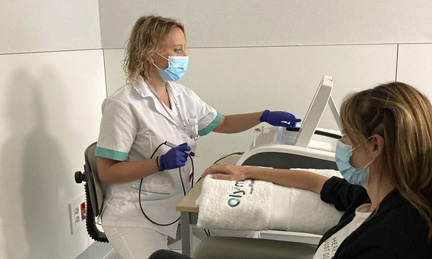Lifestyle Center

Integrative Medicine and Functional Unit
Our aim is to assess your current state of health and anticipate possible disease in order to improve your quality of life.
Integrative medicine combines the best of conventional medicine and lifestyle medicine to provide you with comprehensive, personalised care. Rather than simply treating symptoms, it focuses on treating the underlying cause of disease and promoting long-term health and wellbeing.
We comprehensively assess the patient to identify the underlying causes of disease. We then design personalised treatment plans, which may include a variety of options, such as habit changes and dietary supplements, etc.
We treat the patient as a whole, using a holistic approach, rather than looking at the symptoms separately.
Innovation technology
- Systemic Study

Systemic Study
The Systemic Therapy Diagnostic Machine is a diagnostic and treatment device that uses electromagnetic technology to find imbalances that may be causing health problems. It is based on the idea that every cell, tissue and organ in the human body has a unique frequency and that imbalances in these frequencies may be related to health problems. The machine is used to detect and correct these imbalances using specific electromagnetic signals.
During a systemic therapy session, the patient sits while tests are performed using electrodes and other tools. The machine records the body’s response to different frequencies and electromagnetic waves and uses this information to determine imbalances and help restore the body’s energy balance. It provides information on:
- Health problems in various parts of the body
- Food intolerances and allergies
- Levels of vitamins, minerals and other nutrients in the body
- Toxins and heavy metals in the body
- Function of bodily organs and systems
- Viral loads and types of environmental toxins
- We can perform: genetic studies, viral serology, immunology studies and lymphocyte profiles
Featured treatments
Integrative medicine uses a wide variety of treatments that are tailored to the individual needs and goals of each patient. Some of the most common treatments include:

Lifestyle changes
Emphasises the importance of changing habits to improve health and wellbeing. This may include nutritional changes, physical exercise, stress management techniques, getting enough sleep and avoiding unhealthy habits.

Dietary supplements
Dietary supplements may include vitamins, minerals and other nutrients that help supplement the diet and improve health. These supplements can help correct nutritional deficiencies, improve immune function and reduce inflammation.

Nutrition interventions
The importance of proper nutrition for health and wellbeing. Patients can work with a nutrition specialist to design a personalised meal plan that addresses their individual needs.


